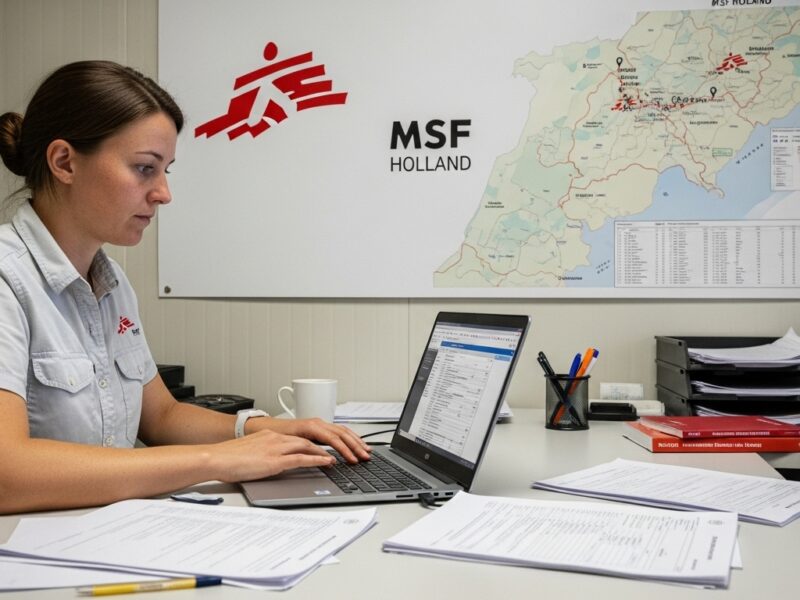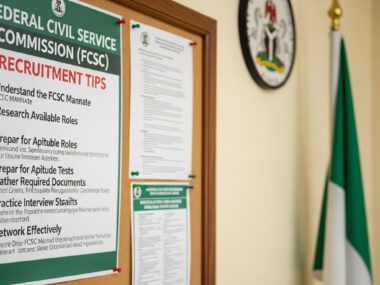If you are passionate about data, healthcare, and making a real difference in people’s lives, then the Medical Data Processing Officer job at Médecins Sans Frontières (MSF) Holland is a golden opportunity for you. Many job seekers in Nigeria and across the world dream of working with MSF, one of the biggest international humanitarian organizations, and now you have the chance to join their mission.
In this article, we will walk you through everything you need to know about the role: job description, qualifications, responsibilities, benefits, and most importantly, how to apply successfully. Whether you are an experienced professional in medical data management or a skilled graduate ready to step into the humanitarian world, this guide will help you understand the entire process and prepare for success.
Who is Médecins Sans Frontières (MSF)?
Médecins Sans Frontières (MSF), also known as Doctors Without Borders, is an international humanitarian organization that provides emergency medical assistance to people affected by conflicts, epidemics, disasters, or exclusion from healthcare.
MSF was founded in 1971 and has grown into one of the most respected non-governmental organizations (NGOs) in the world. With offices in multiple countries including MSF Holland, the organization has provided lifesaving care in over 70 countries.
In Nigeria, MSF has been active for decades, supporting communities affected by crises such as insurgency in the North-East, cholera outbreaks, and maternal health challenges.
Why Work with MSF Holland?
Joining MSF Holland is not just about having a job; it’s about being part of a global humanitarian movement.
Here are a few reasons why many professionals aspire to work with MSF:
- Impactful Work – Every day, you’ll be contributing to saving lives.
- International Experience – MSF operates worldwide, so you gain global exposure.
- Attractive Salary and Benefits – MSF pays competitive NGO salaries, including allowances.
- Career Growth – Opportunities for training, workshops, and professional development.
- Networking – You’ll work with skilled health and humanitarian professionals.
- Prestige – Working with an international NGO boosts your CV and future opportunities.
Understanding the Role: Medical Data Processing Officer
The Medical Data Processing Officer is a crucial role within MSF projects. The officer ensures that all medical data collected from hospitals, clinics, and field operations are properly recorded, analyzed, and stored. This data helps MSF make critical decisions about patient care, resource allocation, and public health strategies.
In simple terms, the job is about turning medical information into actionable insights. Without accurate data, it would be difficult for MSF to measure progress or respond effectively during emergencies.
Key Responsibilities of a Medical Data Processing Officer at MSF Holland
As a Medical Data Processing Officer, your daily work will involve several important tasks. These include:
- Data Collection and Entry
- Gather medical records from clinics, hospitals, and field health centers.
- Enter patient and treatment data into MSF databases.
- Data Cleaning and Verification
- Ensure that data entered is accurate, complete, and free from errors.
- Regularly cross-check data with source documents.
- Data Analysis and Reporting
- Generate reports on patient numbers, disease trends, and treatment outcomes.
- Share insights with medical teams for better planning.
- Database Management
- Maintain and update digital medical records.
- Support the use of specialized medical software.
- Confidentiality and Security
- Protect sensitive patient information.
- Ensure compliance with MSF’s data protection policies.
- Team Support
- Train health staff on data collection tools.
- Work closely with doctors, nurses, and project managers.
Qualifications and Requirements
To qualify for the Medical Data Processing Officer job at MSF Holland, applicants must meet specific requirements. These may vary slightly depending on the location, but generally, you will need:
- Educational Background
- A Bachelor’s degree or Diploma in Health Information Management, Computer Science, Statistics, Public Health, or a related field.
- Technical Skills
- Strong knowledge of Microsoft Excel and database management.
- Familiarity with medical record-keeping and health data software.
- Experience
- At least 1–3 years’ experience in medical data management or health statistics.
- Previous experience with NGOs or humanitarian organizations is an advantage.
- Personal Skills
- Attention to detail.
- Strong analytical skills.
- Good communication and teamwork abilities.
- Other Requirements
- Fluency in English (written and spoken).
- Knowledge of local languages may be an added advantage.
- Ability to work under pressure and in challenging environments.
Salary Structure and Benefits
MSF Holland offers a competitive salary structure for staff, though the exact figure may vary based on location and project budget. On average, a Medical Data Processing Officer at MSF may earn between:
- ₦250,000 – ₦400,000 per month in Nigeria (approximate NGO salary range).
- Additional allowances such as transport, housing, and health insurance.
- Opportunities for training and international workshops.
- Paid leave and retirement benefits depending on contract type.
Also Check Federal Civil Service Commission (FCSC) Recruitment Tips
How to Apply for Medical Data Processing Officer Job at MSF Holland
Here is a step-by-step guide on how to apply successfully:
Step 1: Visit the Official MSF Recruitment Portal
Go to MSF Careers Website. MSF posts all job vacancies on their official platforms.
Step 2: Search for the Job Vacancy
Look for “Medical Data Processing Officer – MSF Holland” under the Nigeria jobs or international vacancies.
Step 3: Read the Job Description Carefully
Check requirements, responsibilities, and application deadlines before applying.
Step 4: Prepare Your Application Documents
You will need:
- A detailed CV (Curriculum Vitae).
- A cover letter highlighting your experience and motivation.
- Copies of relevant certificates.
Step 5: Submit Your Application Online
Upload your documents through the official MSF portal. Avoid third-party websites that claim to collect applications.
Step 6: Await Shortlisting
MSF will review applications and contact shortlisted candidates for written tests or interviews.
Common Mistakes to Avoid During Application
- Submitting incomplete documents – Always attach your CV and cover letter.
- Ignoring job requirements – Apply only if you meet the qualifications.
- Late application – Submit before the deadline.
- Unprofessional CV – Tailor your CV for humanitarian/NGO jobs.
- Using unofficial portals – Always use the official MSF career website.
Tips to Increase Your Chances of Getting Hired
- Highlight Relevant Experience – Show how your skills match the role.
- Emphasize NGO or Data Skills – If you’ve worked with health data or in NGOs, showcase it.
- Prepare for Tests – MSF may test your data management and Excel skills.
- Stay Professional – Write a strong, polite cover letter.
- Network with MSF Staff – Following MSF activities online may help you stay updated.
What Happens After Applying?
If shortlisted, you may go through these stages:
- Written Test – Focused on data management and analysis.
- Oral Interview – To assess communication, technical knowledge, and motivation.
- Reference Check – MSF may contact your previous employers.
- Final Selection – Successful candidates will receive an official offer.
Career Growth for Medical Data Processing Officers
Joining MSF as a Medical Data Processing Officer can open doors to bigger opportunities. With experience, you may advance to roles such as:
- Health Information Manager
- Monitoring and Evaluation (M&E) Officer
- Project Data Manager
- NGO Program Officer
- Public Health Specialist
This role is an excellent stepping stone into international development and humanitarian work.
Conclusion
The Medical Data Processing Officer job at MSF Holland is a rewarding opportunity for anyone passionate about healthcare data and humanitarian service. By meeting the requirements, applying through the right channels, and avoiding common mistakes, you stand a strong chance of being recruited.
Working with MSF is not just about a paycheck; it’s about joining a mission that saves lives and improves healthcare access for vulnerable communities worldwide.
So if you are ready to take your career to the next level, start preparing your application today.
Helpful Links for Applicants






